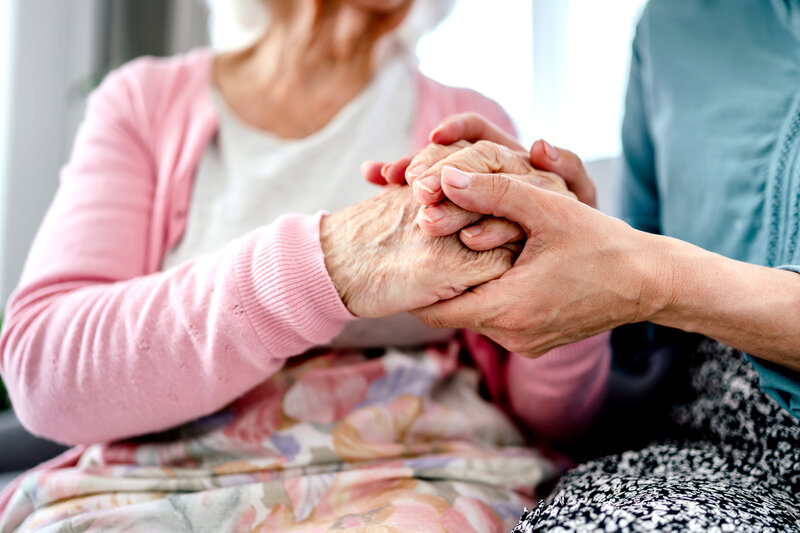The Role Of Hospice Volunteers

We often say that hospice isn’t just for clients; it’s for families too. Hospice volunteers are an essential part of that family support system, offering just about every service, task, chore, or other type of support imaginable.
And when we say essential, we mean essential. When hospice was established as a free service to all in 1982, the ensuing Medicare laws required that trained volunteers account for at least five percent of the hospice provider’s total patient care hours. Without our volunteers, we would lose our Medicare compliance and funding. We want to spread the good word about all the amazing ways our hospice volunteers support our hospice agency, clients, and their families.Hospice Volunteers Do It All
Whether you’re researching to learn more about what volunteers do and how they can support your household or you’re interested in becoming a volunteer, this post honors the reality that we couldn’t do what we do without our volunteers.The Full Hospice Support Team
When you decide to move forward with hospice services, you benefit from a wide range of services and benefits. This includes:- Doctors
- Nurses
- Home aides
- Social workers
- Chaplains
- Volunteers
The Volunteers Are Professionally Educated And Trained
Hospice volunteers undergo a rigorous training period and experience the same initial training as any new hospice employees (including physicians, nurses, chaplains, etc.). They must also pass a complete background check and have a clean DMV record and a current driver’s license, registration, and insurance. Hospice services are very different from those provided by a hospital or healthcare facility because they encompass the client’s (and family’s) mental, emotional, and spiritual well-being, along with facilitating physical comfort. The volunteers are there to step in and provide services that support the comfort and needs of the hospice client (and family) when it comes to daily living tasks as well as respite care.What Do Hospice Volunteers Do?
There are three main roles hospice volunteers fill in our network.Administrative & fundraising
Some of our volunteers work for hospice headquarters or in our hospice house, providing administrative tasks. You may also see them supporting any community outreach programs we run or setting/cleaning up booths or presentations at community fairs or other public events we participate in. In addition, they often answer the phones, organize the office, stuff envelopes, prepare mailings, support social media content, and work tirelessly to raise funds – and awareness – for hospice.Retail & auxiliary fundraising
Most communities have a storefront or retail space that works to raise funds for our agency and to provide information/education about our services. Some volunteers specifically work in our Auxiliary as part of the aforementioned fundraising.Direct patient care & grief support
Finally, our trained volunteers work in both direct patient care and grief support. The former meets a range of needs that come up when a client is in hospice, and the latter provides free grief support in the form of facilitated grief groups. Hospice agencies typically provide free grief support to anyone in the community (whether they’ve used our hospice agency or not). This support is available in one-on-one sessions with licensed therapists or weekly sessions (typically an eight-week format) facilitated by our volunteers.Brainstorm ways our hospice volunteers can support you
Depending on the time of year and the demand, our hospice agency has dozens to more than 100 trained volunteers working to support the various needs that arise for our agency, our clients, and their households. Here is a list of some of the most common ways our volunteers serve clients, but we’re open to hearing any need you might have and working to find a volunteer who fits the bill. We should note that we get to know our volunteers very well during the intense training period, so we make it a practice to place volunteers in households with shared values, interests, and personality types.Respite care
In cases where a spouse or family member is providing the bulk of the caregiving, volunteers are there to provide weekly respite care. These shifts are usually around three hours or so (but can be longer if arranged beforehand), allowing primary caregivers a much-needed and deserved break. Our volunteers are there to attend to the hospice client’s needs, providing primary caregivers with time and space to do whatever they want – whether that be taking a nap, meeting a friend for coffee or meal, attending health/self-care appointments, going on a hike, or anything else that helps them restore their energy reserves.Reasonable household support
Our caregivers can help with all kinds of household support, including things like:- Gardening/plant care
- Light housekeeping
- Grocery and meal support
- Pet care
- Errand running
Companionship
Much of the time, particularly if hospice clients live alone or are in a hospital, a hospice house, assisted living, or memory care center, our volunteers provide weekly companionship. This can include:- Going with them on walks or wheeling them outside for a breath of fresh air
- Reading out loud
- Listening to music or singing songs together
- Looking through client’s scrapbooks and pictures while listening to their stories
- Bringing them a special treat or favorite food and sharing it together
- Playing cards or board games
- And more!